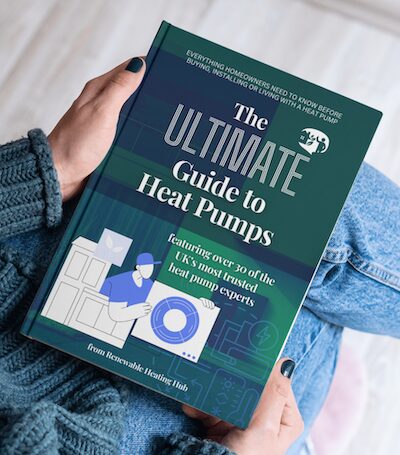Raising product standards for space heating
An interesting post from the government today:
Today we’ve published our consultation on raising product standards for space heating products. This includes increasing minimum performance standards for heat pumps and boilers entering the UK market, banning class I-III temperature controls and also re-banding energy labels so gas boilers are on the same scale as heat pumps but cannot be more than F-rated. You can read the consultation and how to respond here: https://www.gov.uk/government/consultations/raising-product-standards-for-space-heating
Get a copy of The Ultimate Guide to Heat Pumps
Subscribe and follow our YouTube channel!
A big 'hmmm' from me. 😉
The elephant in the sitting room is not the efficiency and rated performance of heat pumps when tested to BS EN 14511 or BS EN 14825 in a laboratory. Nearly all current and popular make and model ASHPs will comfortably pass the Government's minimum performance requirements now and the future requirements they are consulting on....
These proposals do not consider system effect. Testing an ASHP in a climate controlled laboratory with perfectly stable [artificial] control conditions will always give favourable results - there's no losses, inefficiencies or constraints. Put the same ASHP into a real-world retrofit in someone's house and it's not going to perform as well. It's not going to meet the performance declared under BS EN 14511 which MCS cut and paste in their database. It's the real-world performance that matters to the home-owner, because that's directly related to what it will cost them to run.
Currently, to my knowledge, only Heat Geek Installers are prepared to put their money where their mouth is and warrant a minimum installed SCOP inclusive of system effect.
In theory, if you drive up the efficiency of the heat source, then regardless of system effect, there should be some tangible improvement at the emitters and benefit to the homeowner, but that's not guaranteed - especially when the installation quality is pants with all sorts of complicated zone controllers, unsuitable thermostats, poor pipework insulation, buffers and circulating pumps a-plenty.
My initial thoughts, having just skimmed through the first of the four documents:
1: The anticipated cost savings for consumers are pretty low:
Those gains can be very easily wiped out by increased prices for items which are designed and tested to meet the proposed new standards...
... or by incorrect installation.
2: There are some statements which may not reflect 'good science':
Is this correct?
a: Why is the amount of water in the coil significant, whereas there's no suggestion of a Regulation to define the surface area?
My cylinder's coils are vaned, creating a massive surface area.
b: Is it really the case that a DHW cylinder might have almost as much water in the coil as it does in the body of the tank?
Can an installer please comment?!
3: As we're not an official organisation, I think any submission from forum members should read much as the response from @allyfish above.
We need to be telling them how it really is, in plain English.
4: Unlike the submissions from corporates and advisory bodies, we should be including photos, graphs, diagrams etc.
Most respondees to such consultations will send in a 'report' using black text on a white background.
We can do better than that!
5: The Questions embedded in the documents seem to be leading readers down a defined path.
My past experience of this practice is that the later questions tend to only make sense if the respondent has 'agreed' with the DESNZ thinking in the early questions.
I tend to pick that up and respond accordingly, such as
This question is biased. It assumes that the responses to questions 13-18 were in favour of achieving greater efficiency by defining standards for component parts of a heating system.
However, the greatest loss of efficiency is due to poor system design and shoddy installation.
Those significant losses can't be addressed by using components with higher specifications.
(NB the above is just an example. I haven't actually checked Questions 13-18 !)
6: We don't have to answer all questions.
Nor do we have to send in the whole lot in one go.
7: The consultation has an email address : spaceheatingstandards@energysecurity.gov.uk
Any of us can therefore send in additional relevant material which DESNZ hasn't consulted on.
Just because the authors have omitted something, shouldn't prevent any of us from writing in to say to so and then explain it !
If you feel suitably stirred up, you can send in a complete alternative strategy which would better achieve the cost savings and/or better reflect Government policy to attain Net Zero.
For example, I don't see why this Consultation should commence with para.2 in the Exec Summary proposing changes to regulations for boilers which won't come into force until 2028.
So just how does that comply with Net Zero strategy?! 🤔
Save energy... recycle electrons!
- 26 Forums
- 2,360 Topics
- 53.5 K Posts
- 127 Online
- 6,026 Members
Join Us!
Worth Watching
Latest Posts
-

Sadly, no, @agentgeorge. The inverter will handle 5kW t...
By Majordennisbloodnok , 2 hours ago
-
RE: New Fogstar 15.5kWh upright solution
@transparent The readings are 0 for amps, 0 ...
By Batpred , 2 hours ago
-

RE: Say hello and introduce yourself
@velcro welcome to the forums. Please feel free start a...
By Mars , 3 hours ago
-
RE: Speedcomfort radiator fans
I watched the video to see whether they'd potentially b...
By Sheriff Fatman , 3 hours ago
-
RE: Mitsubishi Ecodan R290 10kW performance
@ecoste For what it's worth, this is my equivalent data...
By Sheriff Fatman , 4 hours ago
-
Daikin EDLA11D3V3 DHW Settings
I have a newly installed EDLA11D3V3 which I'm still get...
By Velcro , 4 hours ago
-

RE: Setback savings - fact or fiction?
Will come back to the above points, but for now, I've j...
By cathodeRay , 4 hours ago
-

@jamespa I have found that it comes as a shock when we ...
By Toodles , 6 hours ago
-
RE: My Powerwall 3 Consumes 3-4 kWh/Day in Self-Consumption: Is This Normal?
I suspect a good chunk of the "losses" are power consum...
By Bash , 7 hours ago
-

RE: Need Help Optimising My Rushed ECO4 Install: 12kW Bosch Heat Pump
Hi @mickamills . Welcome to the forum. It sounds like...
By bontwoody , 8 hours ago
-
RE: Midea ASHP – how to set weather compensation
@curlykatie did you get sorted with this?
By MickaMills , 8 hours ago
-

RE: External pipework insulation
@transparent I hope you are not being admonished @trans...
By Toodles , 8 hours ago
-
RE: Octopus Cosy Heat Pump Owners & Discussion Thread
The FT levels off at either the set point OR the minimu...
By AndrewJ , 1 day ago
-
RE: MyVaillant Connect Regular Disconnect
Thanks. Yes, if the time is consistently 11pm every nig...
By buckwem , 1 day ago
-
RE: Who's your electricity provider and what's your tariff?
@transparent Thanks, this helps. Could it be that St...
By Batpred , 1 day ago
-
RE: Clivet ASHPs and weather compensation
Simon did share a lot of very helpful advice. On furthe...
By ambris , 1 day ago
-
-
RE: Advice on internal circulation pump noise
Extend the primary branch and make sure you have more t...
By ASHP-BOBBA , 2 days ago








